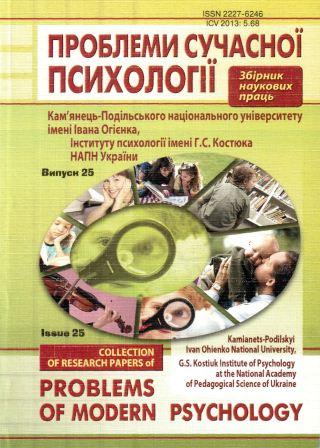Психологічний аналіз комп’ютерно-опосередкованої комунікації
DOI:
https://doi.org/10.32626/2227-6246.2014-25.%25pKeywords:
комп’ютерно-опосередкована комунікація, соціальні взаємодії, теорії відфільтрованих сигналів, теорія соціальної присутності, комунікаційні медіа, теорія про брак сигналів соціального контексту, сигнали індивідуальності, нормативна поведінка, теорія медіа-збагачення.Abstract
У статті проаналізовано комп’ютерно-опосередковані комунікації з психологічної точки зору. Описано групу теорій відфільтрованих сигналів, зокрема теорію соціальної присутності, теорію про брак сигналів соціального контексту та теорію медіа-збагачення. Постулюється через теорію соціальної присутності, що комунікаційні медіа різняться своєю здатністю передавати класи невербальної комунікації на додаток до вербального змісту. Чим меншу кількість знакових систем підтримує певна медіа-система, тим менше відчуття емоційної теплоти та залучення, причетності мають стосовно один одного користувачі цієї системи. Розглянуто теорію про брак сигналів соціального контексту, засновану на припущенні, що комп’ютерно опосередковані комунікації виключають сигнали індивідуальності та нормативної поведінки, що їх взаємодія «лицем до лиця» передає невербально. В теорії медіа-збагаченості стверджено, що є кореляція між ситуацією двозначності повідомлення та багатством середовища, у якому воно передається. Визначено концепт медіа-збагаченості теоретично чотирма вимірами: кількість знакових систем, підтримуваних медіа-середовищем; негайність зворотнього зв’язку, забезпечувана медіа-середовищем; потенціал для розмовного стилю мовлення; рівень персоналізованості повідомлення. Доведено, що другим ядерним концептом моделі медіа- збагаченості є ситуація двозначності повідомлення. Проаналізовано аргументи та дослідження як на користь наведених теорій, так і з точки зору їх критики. Історія суперечностей між тим, що було досліджено в теоріях відфільтрованих сигналів, та більш просоціальними ефектами комп’ютерно-опосередкованих комунікацій може бути пояснена частково методологічними складнощами дослідження взаємодії у комп’ютерно-опосередкованих комунікаціях.
References
Amichai-Hamburger, Y. The social net: Understanding human
behavior in cyberspace / Y. Amichai-Hamburger . – Oxford,
UK: Oxford University Press., 2005. – 296 р.
Baym N. K. Personal connections in the digital age /
N. K. Baym. – Cambridge, UK: Polity Press, 2010. –
р.
Boyd D. Why youth V social network sites: The role of
networked publics in teenage social life / D. Boyd. // Youth,
identity, and digital media Cambridge: MIT Press, – 2007. –
РP. 119-142.
Culnan M. J. Information technologies / M. J. Culnan,
M. L. Markus. // Handbook of organizational communication:
An interdisciplinary perspective – Newbury Park, CA: Sage. –
– РР. 420-443.
Daft R. L. Organizational information requirements, media
richness and structural design / R. L. Daft, R. H. Lengel //
Management Science. Vol. 32. – 1986. – РP. 554-571.
Heino R. D. Relationshopping: Investigating the market
metaphor in online dating / R. D. Heino, N. B. Ellison,
J. L. Gibbs // Journal of Social and Personal Relationships.
Vol. 27. – 2010. – PР. 427-447.
Joinson A. The Oxford handbook of Internet psychology /
A. Joinson, K. McKenna, T. Postmes, U. – D. Reips. – Oxford,
UK: Oxford University Press, 2007. – 508 р.
Katz J. E. Social consequences of Internet use: Access,
involvement, and interaction / J. E. Katz, R. E. Rice. –
Cambridge: MIT Press, 2002. – 460 р.
Konijn E. A. Mediated interpersonal communication /
E. A. Konijn, S. Utz, M. Tanis, S. B. Barnes. – New York:
Routledge, 2008. – РР. 309–330.
Scott C. R. A whole-hearted effort to get it half right: Predicting
the future of communication technology scholarship /
C. R. Scott // Journal of Computer-Mediated Communication.
Vol. 14. – 2009. – РP. 753-757.
Short J. A. The social psychology of telecommunication /
J. A. Short, E. Williams, B. Christie. – Chichester : John Wiley,
Siegel J. Group processes in computer-mediated communication / J. Siegel, V. Dubrovsky, S. Kiesler, T. W. Mcguire //
Organizational Behavior and Human Decision Processes.
Vol. 37. – 1986. – PР. 157-187.
Yzer M. C. New communication technologies, old questions /
M. C. Yzer, B. G. Southwell // American Behavioral Scientist.
Vol. 25. – 2008. – P. 8-20.
Downloads
How to Cite
Issue
Section
License
Copyright
The Editorial Board has the full right to publish original scientific papers containing results of theoretical and experimental research works which are not currently subject to review for publication in other scientific editions. The Author shall transfer to the editorial board of the Collection the right to spread the electronic version of the paper, as well as the electronic version of the paper translated into English (for papers originally submitted in Ukrainian and Russian) by all kinds of electronic means (placement at the official website of the Collection, electronic databases, repositories etc).
The Author of an article reserves the right to use materials of the paper, without approval with the editorial board and the founders of this Collection: a) partially or fully, for educational purposes; b) for writing own dissertation papers; c) for preparation of abstracts, conference reports and presentations.
The Author of an article can place electronic copies of the paper (including the final electronic version downloaded from the official website of the Collection) at:
- personal web resources of all Authors (websites, webpages, blogs etc.);
- web resources of the institutions where the Authors are employed (including electronic institutional repositories);
- non-profit public access web resources (for example, arXiv.org).
But in all cases, it is obligatory to have a bibliographic reference to the paper, or a hyperlink to its electronic copy placed at the official website of this Collection.






